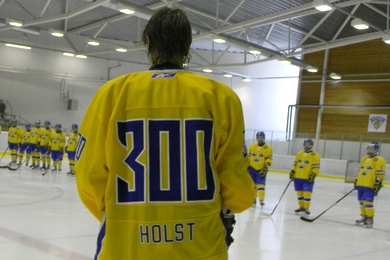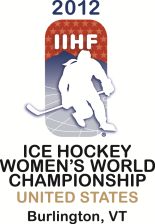VIERUMÄKI, Finland – In 1984, when Tre Kronor went to the final in the Canada Cup, Erika Holst, 5, was watching the games at home in Varberg, Sweden, and decided that she’d be just like centre Bengt-Åke Gustafsson.
She joined her first team playing with 7-year-old boys, but later returned to the team with kids her own age, and then played with that team (of boys) until she was 19.
Last week, the captain of the
Damkronorna played her 300th game with the women’s national team – more than any other female hockey player – and she celebrated it by scoring a goal in the game against Japan.
Holst flew by Gustafsson’s 117 games a long time ago.
“My first national team game was in Stockholm, against Finland, and we lost. I don’t remember the game particularly well, but I do remember standing on the blueline and being very, very nervous,” she told IIHF.com.
“It was huge to be there. Playing for Sweden had always been my goal,” she adds.
Only seven players have played more national team games than Holst. The seventh, Vyacheslav Fetisov, has 314 games to his credit, but getting to Raimo Helminen’s 330 may take Holst a couple of years.
 Erika Holst got a special jersey with the number 300 – the mark she has cracked during the IIHF Twelve Nations Invitational Tournament Series.
Erika Holst got a special jersey with the number 300 – the mark she has cracked during the IIHF Twelve Nations Invitational Tournament Series.Now 32, Holst says she still has several good years ahead of her, but as most veteran players, she takes it one season at a time.
“My focus is now on the World Championship in April. But of course, it’s the beginning of a new season, and it really feels good to be here. I have a feeling that we have something special brewing,” she says of the Swedish team.
The 300th game did prompt her to take a short trip down the memory lane. But, even if Holst is only 32, the team around her has changed almost completely.
“Basically, only [goaltender] Kim [Martin] is left from the 2002 Salt Lake City team. That’s how it is in women’s hockey. You get in early, but you also leave early,” she says.
When not being the greatest ambassador for Swedish women’s hockey on the ice, Holst is promoting the game in other ways. In July, she was named one of 18 player ambassadors in the IIHF’s new development initiative for women’s hockey, in which mentors and ambassadors from the top four countries assist women’s programs in nine other countries during two-and-a-half years.
And in May 2011, she became the women’s hockey development manager at the Swedish federation.
“I’ll be in charge of developing women’s hockey in Sweden,” she told IIHF.com in April during the last Women’s World Championship, “so I’ll be helping with hockey schools and keeping in contact with the different districts and clubs that have women’s hockey and try to get more girls come to the rink. I will try to make more women aware of hockey and get more people to play and watch.”
And because it’s an Olympic sport, in Sweden, the Olympic committee has put in resources so that some of the players have been able to work part-time or focus on hockey completely, says Holst, who has also worked as a hockey teacher for high school girls.
While women’s hockey came under criticism after the 2010 Olympics by the IOC because it is dominated by the North American teams, it should be noted that the game has developed in leaps and bounds. As Holst put it, “you can’t even compare the game from 2010 to the game that was played in 1998.”
Holst, a six-time Swedish champion and a four-time medalist in the Olympics and the World Championships, will play in her 17th major international tournament in April. It all started at the 1995 European Championship, just six years after the first Swedish women’s national team played for the European Championship, making her a true pioneer of the sport.
And her job’s not done.
“In Sweden, there are already women who have football as their profession. That’s where we’d like to get to, too,” she says.
But first, she wants to keep on scoring goals for Sweden. She scored five goals and added two assists in Sweden’s first four games of the Vierumäki tournament, leading the team in goal scoring.
Maybe, hopefully, come April, five-year-olds around Sweden see her play and decide that they want to be just like Erika Holst.
RISTO PAKARINEN







